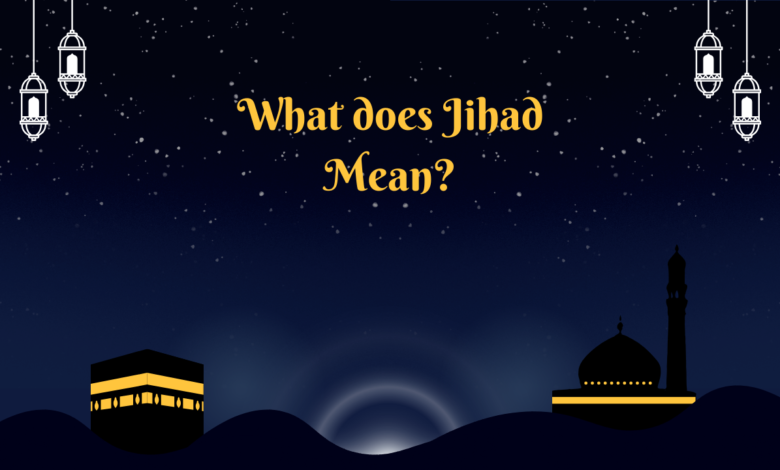
What does Jihad Mean?
Jihad is an Arabic term that means “struggle” or “striving.” It has both spiritual and physical dimensions, and its meaning can vary depending on the context and interpretation.

Introduction
The term “jihad” is one of the most widely misunderstood and controversial words in the world today. Often associated with violence and terrorism, it is essential to recognize that the concept of jihad is far more complex and nuanced than many believe. In this article, we will delve into the various meanings and interpretations of jihad, shedding light on its historical, religious, and contemporary dimensions.
Defining Jihad
Jihad, an Arabic word, is derived from the root word “jahada,” which means “to strive” or “to exert effort.” In its essence, jihad is a concept that signifies a personal and spiritual struggle, often within the context of Islamic faith. It is a multifaceted term with various interpretations, and these interpretations can be broadly categorized into two main dimensions: the greater jihad (al-jihad al-akbar) and the lesser jihad (al-jihad al-asghar).
Also check.
- What is Jihad?
- What Is The Second Pillar Of Islam?
- What Do Judaism Christianity and Islam Have In common?
- Why Taking Bribe is Haram in Islam?
- Why is Hajj Important?
Greater Jihad (Al-Jihad Al-Akbar)
The greater jihad refers to the inner, spiritual struggle that Muslims engage in to overcome personal shortcomings, temptations, and sin. This internal battle is seen as the most important form of jihad in Islam, emphasizing the spiritual growth and moral development of the individual. It involves efforts to cultivate virtues, live a righteous life, and fulfill one’s religious duties.
Lesser Jihad (Al-Jihad Al-Asghar)
The lesser jihad, on the other hand, pertains to external or physical struggle, often involving self-defense or the defense of one’s community or faith. It is commonly associated with armed conflict, but it also encompasses non-violent forms of resistance, such as advocacy for justice, humanitarian work, or peaceful protests. This dimension of jihad aims to protect the Muslim community (ummah) from external threats and oppression.
Historical Context
The historical context in which the concept of jihad emerged is crucial for understanding its evolution and significance. During the early years of Islam in the 7th century, Muslims faced persecution and violence from various quarters. In this context, the concept of jihad took shape as a means of self-defense and preservation of the fledgling Muslim community.
It is important to note that the Quran and Hadith (sayings and actions of the Prophet Muhammad) provide guidelines for the conduct of jihad. These sources emphasize principles such as proportionality, avoidance of harm to civilians, and the importance of just war. Moreover, classical Islamic scholars have elaborated on the rules of engagement in jihad, emphasizing the need for legitimate authority and clear objectives.
Modern Interpretations
In the modern world, jihad has been a subject of intense debate and controversy, largely due to its association with acts of violence and terrorism. Radical extremist groups have misappropriated the concept, using it to justify acts of terror. However, these interpretations do not represent the mainstream understanding of jihad within Islam.
Many contemporary Muslim scholars and leaders emphasize the peaceful and spiritual dimensions of jihad. They argue that true jihad involves working towards social justice, supporting the oppressed, and engaging in charitable endeavors. In this context, jihad becomes a means of self-improvement and a tool for making a positive impact on society.
Conclusion
In conclusion, jihad is a multifaceted concept that holds different meanings for different people. While it is often associated with violence and extremism, it is essential to recognize that the majority of Muslims understand jihad as a broader and more profound concept. It encompasses both the greater jihad of self-improvement and the lesser jihad of external struggle, with a strong emphasis on self-defense and justice.
Misconceptions about jihad have fueled fear and prejudice. To foster a better understanding, it is crucial to engage in open dialogue and recognize the diverse interpretations of this complex concept within the Muslim world. In doing so, we can move beyond stereotypes and misconceptions and work towards a more peaceful and inclusive world.

FAQs
What does the term ‘jihad’ mean?
Jihad is an Arabic term that means “struggle” or “striving.” It has both spiritual and physical dimensions, and its meaning can vary depending on the context and interpretation.
What is the greater jihad and lesser jihad?
The greater jihad (al-jihad al-akbar) refers to the inner, spiritual struggle of an individual to improve themselves morally and spiritually. The lesser jihad (al-jihad al-asghar) involves external struggles, which can include self-defense or the defense of one’s faith and community.
How is jihad viewed in Islam?
In Islam, jihad is primarily seen as a spiritual struggle to become a better person and fulfill religious duties. It can also include the defense of one’s faith and community, but this must be conducted in accordance with specific ethical and legal principles.
Is jihad always associated with violence and terrorism?
No, jihad is not inherently associated with violence or terrorism. While some extremist groups have misappropriated the term, the majority of Muslims understand jihad to include peaceful and non-violent aspects, such as charitable work and advocating for social justice.
Are there guidelines for conducting jihad in Islam?
Yes, Islam provides guidelines for conducting jihad. The Quran and Hadith emphasize principles such as proportionality, avoidance of harm to civilians, and the importance of just war. Classical Islamic scholars have also elaborated on the rules of engagement.
How has the concept of jihad evolved throughout history?
Jihad has evolved over time. In its early history, it was often associated with self-defense and protection of the Muslim community. In the modern era, interpretations have diversified, with many Muslims emphasizing peaceful and humanitarian aspects of jihad.
Are there different interpretations of jihad within the Muslim world?
Yes, there are various interpretations of jihad within the Muslim world, ranging from the more spiritual and non-violent to the more militant and extremist. Interpretations can vary based on cultural, social, and political factors.
How can we address misconceptions about jihad?
To address misconceptions, it’s essential to engage in open dialogue, promote education, and encourage understanding of the diverse interpretations of jihad within the Muslim community. Promoting accurate information and countering stereotypes is crucial.
Is jihad an individual or collective effort?
Jihad can be both individual and collective. The greater jihad is primarily an individual’s internal struggle, whereas the lesser jihad often involves collective efforts for self-defense or the protection of the community.
Is jihad exclusive to Islam, or do other religions have similar concepts?
Many religions have similar concepts of spiritual struggle and self-improvement, though they may use different terminology. The term “jihad” is specific to Islam but shares commonalities with concepts found in other faiths.




